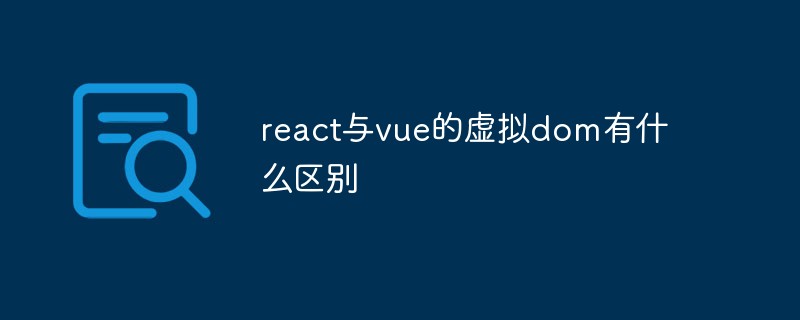這篇文章手把手帶大家開發一個超實用的vue載入Button元件--LoadingButton,希望對大家有幫助。

元件背景
在平常的工作中,常常會遇到一個場景:

#點擊按鈕時請求一些介面數據,而為了避免用戶重複的點擊我們通常會為這些按鈕添加loading。這個新增loading的功能本身時非常簡單的,只要我們定義一個變數使用在Button元件中即可,但在做後台管理類別專案時,這樣的按鈕可能會有非常非常多,可能一個元件中,很多變數都是xxx_loading,耗時耗力又不夠優雅。
接下來,我們對Button元件做一個簡單的封裝來解決這個耗時耗力又不夠優雅的loading問題。 (學習影片分享:vue影片教學)
靈感來源
我們在使用Antd的
Modal對話方塊時,當我們的onOk為非同步函數時,此時Modal的確定按鈕會自動新增loading效果,在函數執行完成後關閉彈窗,就像這樣:

#此時,程式碼如下:
asyncFunc() {
return new Promise(resolve => {
setTimeout(() => {
resolve()
}, 2000)
})
},
handleTestModal() {
const that = this
this.$confirm({
title: '测试异步函数',
content: '异步函数延迟两秒结束',
async onOk() {
await that.asyncFunc()
}
})
},#看到這種效果後,就想到,如果可以封裝一個
Button元件,將需要執行的函數傳入,元件中自動根據函數執行情況添加loading效果豈不是非常的方便。
實作LoadingButton
#定義元件參數
##這邊就定義幾個大家會常用的參數:text(按鈕文字)、type(按鈕類型)、asyncFunc(按鈕點擊時執行的非同步函數)、delay(loading延遲),另外,還需要一個元件內部的loading變數來控制我們Button元件的狀態,程式碼如下:
export default {
data() {
return {
loading: false
}
},
props: {
text: {
type: String,
default: '确定'
},
type: {
type: String,
default: 'primary'
},
delay: {
type: Number,
default: 0
},
asyncFunc: {
type: Function,
default: () => {}
}
},
} 使用antd<span style="font-size: 18px;"></span>中的Button<span style="font-size: 18px;"></span>元件進行二次封裝
LoadingButton元件中,將上面定義的參數使用起來,並綁定一個click事件,程式碼如下:
<template>
<Button :type="type" :loading="loading" @click="handleClick">
{{ text }}
</Button>
</template>
<script>
import { Button } from 'ant-design-vue'
export default {
components: {
Button
},
methods: {
handleClick() {}
}
}
</script>
判斷非同步函數asyncFunc<span style="font-size: 18px;"></span>
asyncFunc參考函數是非同步函數時,元件需要添加loading的動畫,那麼我們應該如何去判斷一個函數是否為非同步函數呢?
antd是如何實現的? 上面我們剛剛介紹了
的Modal對話方塊中有類似的邏輯,那麼不妨去閱讀這部分相關的源碼,看看antd的實作方式:<pre class='brush:php;toolbar:false;'>// components/modal/ActionButton.jsx
onClick() {
const { actionFn, closeModal } = this;
if (actionFn) {
let ret;
if (actionFn.length) {
ret = actionFn(closeModal);
} else {
ret = actionFn();
if (!ret) {
closeModal();
}
}
if (ret && ret.then) {
this.setState({ loading: true });
ret.then(
(...args) => {
// It&#39;s unnecessary to set loading=false, for the Modal will be unmounted after close.
// this.setState({ loading: false });
closeModal(...args);
},
e => {
// Emit error when catch promise reject
// eslint-disable-next-line no-console
console.error(e);
// See: https://github.com/ant-design/ant-design/issues/6183
this.setState({ loading: false });
},
);
}
} else {
closeModal();
}
},</pre>閱讀
原始碼的實現,我們知道,判斷一個函數是否是非同步函數,可以透過判斷函數是否有 .then(ret && ret.then)方法,那麼我們也可以類似的做一個判斷,程式碼如下:<pre class='brush:php;toolbar:false;'>async handleClick() {
const asyncFunc = this.asyncFunc
if (!this.isFunc) {
return
}
const ret = asyncFunc()
// 如果是异步函数,则显示loading
if (ret && ret.then) {
this.loading = {
delay: this.delay
}
ret.finally(() => {
this.loading = false
})
}
}</pre>
LoadingButton元件
LoadingButtonasyncFunc元件是否符合預期:demo程式碼如下:
<template> <div> <LoadingButton :delay="500" :asyncFunc="asyncFunc" /> </div> </template> <script> import LoadingButton from './LoadingButton.vue' export default { data() { return { loading: false } }, components: { LoadingButton }, methods: { asyncFunc() { return new Promise(resolve => { setTimeout(() => { resolve() }, 2000) }) } } } </script>我們寫了一個非同步函數
用來模擬實際業務中的非同步請求,現在可以看效果:
 #符合先前的預期效果,這樣我們再有類似需要
#符合先前的預期效果,這樣我們再有類似需要
的場景時,就可以直接使用LoadingButton元件,將點擊需要執行的非同步函數傳入即可,不需要再去定義loading變數。 <h2 id="strong-写在最后-strong"><strong>写在最后</strong></h2>
<blockquote><p>这个组件其实核心的代码非常少,也很容易读懂。由于最近在做一些业务这类场景比较多,感觉这个小组件还是挺实用的所以分享给大家,这里也是只对最重要的部分做了一个介绍,相信大家学会了之后也可以通过这个方式封装出符合自己实际场景需求的组件。最后,附上这个组件的完整代码:</p></blockquote><pre class='brush:php;toolbar:false;'><template>
<Button :type="type" :loading="loading" @click="handleClick">
{{ text }}
</Button>
</template>
<script>
import { Button } from &#39;ant-design-vue&#39;
export default {
data() {
return {
loading: false
}
},
props: {
text: {
type: String,
default: &#39;确定&#39;
},
type: {
type: String,
default: &#39;primary&#39;
},
delay: {
type: Number,
default: 0
},
asyncFunc: {
type: Function,
default: () => {}
}
},
components: {
Button
},
computed: {
isFunc() {
return typeof this.asyncFunc === &#39;function&#39;
}
},
methods: {
async handleClick() {
const asyncFunc = this.asyncFunc
if (!this.isFunc) {
return
}
const ret = asyncFunc()
// 如果是异步函数,则显示loading
if (ret && ret.then) {
this.loading = {
delay: this.delay
}
ret.finally(() => {
this.loading = false
})
}
}
}
}
</script></pre><blockquote>
<p>原文地址:https://juejin.cn/post/7099234795720278046</p>
<p>作者:liangyue</p>
</blockquote>
<p>(学习视频分享:<a href="https://www.php.cn/course/list/1.html" target="_blank">web前端开发</a>、<a href="https://www.php.cn/course/list/91.html" target="_blank" textvalue="编程基础视频">编程基础视频</a>)</p>
以上是vue元件實戰:開發一個載入Button元件--LoadingButton的詳細內容。更多資訊請關注PHP中文網其他相關文章!
 vue中props可以传递函数吗Jun 16, 2022 am 10:39 AM
vue中props可以传递函数吗Jun 16, 2022 am 10:39 AMvue中props可以传递函数;vue中可以将字符串、数组、数字和对象作为props传递,props主要用于组件的传值,目的为了接收外面传过来的数据,语法为“export default {methods: {myFunction() {// ...}}};”。
 聊聊vue指令中的修饰符,常用事件修饰符总结May 09, 2022 am 11:07 AM
聊聊vue指令中的修饰符,常用事件修饰符总结May 09, 2022 am 11:07 AM本篇文章带大家聊聊vue指令中的修饰符,对比一下vue中的指令修饰符和dom事件中的event对象,介绍一下常用的事件修饰符,希望对大家有所帮助!
 如何覆盖组件库样式?React和Vue项目的解决方法浅析May 16, 2022 am 11:15 AM
如何覆盖组件库样式?React和Vue项目的解决方法浅析May 16, 2022 am 11:15 AM如何覆盖组件库样式?下面本篇文章给大家介绍一下React和Vue项目中优雅地覆盖组件库样式的方法,希望对大家有所帮助!
 react与vue的虚拟dom有什么区别Apr 22, 2022 am 11:11 AM
react与vue的虚拟dom有什么区别Apr 22, 2022 am 11:11 AMreact与vue的虚拟dom没有区别;react和vue的虚拟dom都是用js对象来模拟真实DOM,用虚拟DOM的diff来最小化更新真实DOM,可以减小不必要的性能损耗,按颗粒度分为不同的类型比较同层级dom节点,进行增、删、移的操作。


熱AI工具

Undresser.AI Undress
人工智慧驅動的應用程序,用於創建逼真的裸體照片

AI Clothes Remover
用於從照片中去除衣服的線上人工智慧工具。

Undress AI Tool
免費脫衣圖片

Clothoff.io
AI脫衣器

AI Hentai Generator
免費產生 AI 無盡。

熱門文章

熱工具

MantisBT
Mantis是一個易於部署的基於Web的缺陷追蹤工具,用於幫助產品缺陷追蹤。它需要PHP、MySQL和一個Web伺服器。請查看我們的演示和託管服務。

SublimeText3漢化版
中文版,非常好用

Dreamweaver CS6
視覺化網頁開發工具

mPDF
mPDF是一個PHP庫,可以從UTF-8編碼的HTML產生PDF檔案。原作者Ian Back編寫mPDF以從他的網站上「即時」輸出PDF文件,並處理不同的語言。與原始腳本如HTML2FPDF相比,它的速度較慢,並且在使用Unicode字體時產生的檔案較大,但支援CSS樣式等,並進行了大量增強。支援幾乎所有語言,包括RTL(阿拉伯語和希伯來語)和CJK(中日韓)。支援嵌套的區塊級元素(如P、DIV),

DVWA
Damn Vulnerable Web App (DVWA) 是一個PHP/MySQL的Web應用程序,非常容易受到攻擊。它的主要目標是成為安全專業人員在合法環境中測試自己的技能和工具的輔助工具,幫助Web開發人員更好地理解保護網路應用程式的過程,並幫助教師/學生在課堂環境中教授/學習Web應用程式安全性。 DVWA的目標是透過簡單直接的介面練習一些最常見的Web漏洞,難度各不相同。請注意,該軟體中










